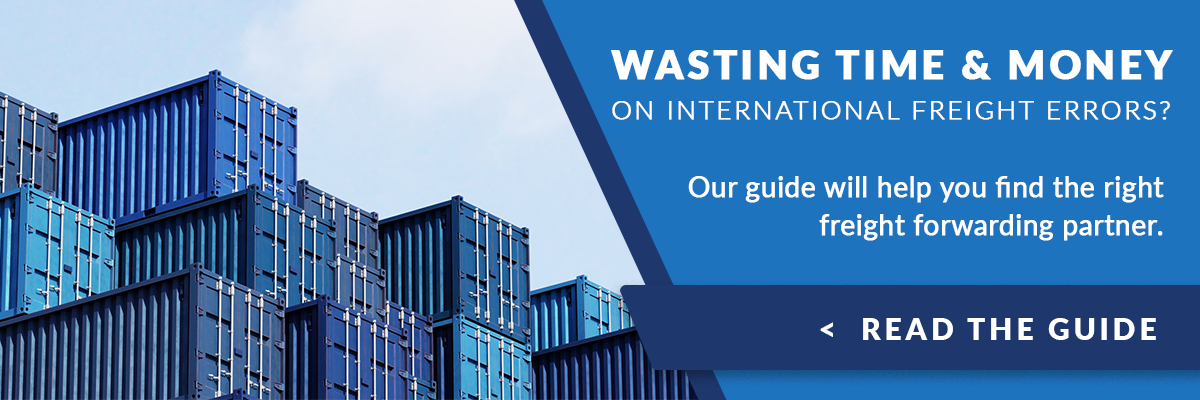
Freight management involves more than moving goods from point A to point B. When done right, it maximizes a company’s efficiency and improves its bottom line. When done poorly, it can lead to delayed goods, dissatisfied customers, and unexpected costs.
Freight management is not a luxury. It’s a necessity for successful businesses to navigate the complex world of exporting and importing goods. Freight forwarders manage the pulse of this process, matching companies’ loads to freight carriers and planning routes, and optimizing the transport process.
Excellent freight management will get goods where they need to go in a timely and cost-efficient manner. But before rushing out and securing a freight management solution, know what freight management is, understand its benefits, and learn how to evaluate possible solutions.
What is Freight Management?
Freight management organizes inbound and outbound goods for transport to ensure products arrive at their destination at the right time and the right price. A freight manager coordinates transport with carriers, distributors, vendors, and shippers to get cargo to its destination safely, efficiently, and on time.
Sometimes shipments go missing or never arrive. Without a freight manager, companies must track missing shipments on their own. They may check carrier websites for time-stamped scans and learn their shipments are not lost but delayed. They may not find their shipments at all. If that happens, it becomes difficult to learn what happened to the freight.
Companies can ship their goods without freight managers, but they may lack the internal expertise to figure out all the components of the shipping process. There are many rules and regulations that vary from commodity to commodity. If the proper rules and regulations are not followed, costs can skyrocket. Failing to file the right paperwork or filing incorrect paperwork can delay or detain goods. Freight forwarders simplify these processes for seamless transportation.
Freight managers:
- Review shipping documentation to ensure compliance with regulatory requirements.
- Coordinate with shipping companies to negotiate rates and routes.
- Maintain all shipping records, including tracking information for every shipment.
- Coordinate with insurance companies when cargo gets lost or damaged.
- Communicate shipment details and delivery schedules with shippers.
Why is Freight Management Critical to Business?
The ability to deliver shipments on time, to the right destination, without damage or loss, at the lowest possible cost is critically important to every successful business.
To get goods where they need to go, freight managers ship cargo by air, road, rail, and ocean. Today’s customers expect a smooth transportation experience. Delivery on time and without damage is crucial to that shipping experience.
A freight management program can also lead to long-term cost-effectiveness. Companies can do everything in-house, but costs can add up quickly if paperwork is missed or out of line. When companies rely on a freight manager, the paperwork gets filed correctly and on time.
Freight management also increases efficiency, as a freight forwarder considers all transportation options. The company may have operated the same way for a long time, but that does not mean they are operating most effectively. Freight forwarders can give a company new perspectives and access to innovative solutions, whether that’s removing extra days of transit time or reducing costs.
Record keeping and data tracking take time and ensure compliance. Freight forwarders keep a close eye on shipments and maintain all data and records so shippers don’t have to.
Cybersecurity challenges top company concerns, and with good reason. A cyberattack on a shipping company can shut down its global operations for weeks and send customers scrambling for alternative transport solutions. Using a freight forwarder helps companies keep goods moving during disruptions. They can pinpoint where goods are in transit, and because they maintain relationships with many carriers, they can secure cargo space on alternative routes.
Companies can also use freight forwarders to streamline operations. These entities have the knowledge and resources to select cost-effective and dependable carriers, track data and shipments, and cover final delivery. They leave nothing to chance and free company resources for other operational needs.
Freight management also improves visibility into logistics operations. A freight forwarder uses technology to access and share detailed information about cargo transport, from sourcing to delivery.
Using a freight forwarder simplifies shipping. Companies gain peace of mind by letting someone with experience, knowledge, and resources handle their freight. When things go wrong, costs can add up quickly.
What to Look for in a Freight Management Solution
Companies looking for a more transparent, reliable, and adaptable logistic solution may find it in an experienced freight forwarder.
The first thing to look for in a freight forwarder is a relationship and a feeling that everyone’s core values and goals are aligned.
Choose a freight forwarder with experience in the industry and the country you are importing from. Each country’s rules and regulations are specific and ever-changing, so partnering with a knowledgeable freight forwarder is vital.
Consider how the freight forwarder handles cybersecurity. Ask about their backup plans and how they handle cyberattacks. Some freight forwarders have a better handle on cybersecurity than others.
Pricing is another consideration. The lowest price may be attractive but may not correlate to the highest level of service. Ensure a freight forwarder’s rates include cybersecurity, centralized data access, and excellent communications.
Takeaway
Freight management in today’s complex shipping world is not a luxury. It’s a must. A freight forwarder helps companies organize and optimize logistics to drive efficiency, keep costs low, and improve customer service.
Many businesses agree freight forwarders are an investment in company success. When freight managers run transportation operations, companies can get back to business and focus on what they do best—making a quality product.



